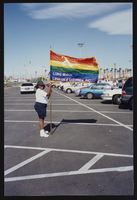Search the Special Collections and Archives Portal
Search Results
Cindy Baca oral history interview
Identifier
Abstract
Oral history interview with Cindy Baca conducted by Barbara Tabach on May 22, 2019 for the Remembering 1 October Oral History Project.
Cindy Baca, born and raised in Las Vegas, talks about her family and occupation as a librarian at Escobedo Middle School. Cindy's twin daughters were present and injured during the Route 91 Festival and October 1 shooting. She describes their experiences and the Random Acts of Kindness project she piloted at her school after the incident.
Archival Collection
Monroe Williams oral history interview
Identifier
Abstract
Oral history interview with Monroe Williams conducted by Claytee D. White on August 15, 2000 and August 22, 2000 for the Boyer Early Las Vegas Oral History Project. In this interview Monroe Williams discusses moving to Las Vegas, Nevada in 1943, living in the historical Westside neighborhood, and being one of the first black fire fighters in Las Vegas. He also talks about being involved with the National Association for the Advancement of Colored Peoples (NAACP), being in the Navy for two years, and his real estate and property management companies.
Archival Collection
Gay history: Las Vegas, 2017
Level of Description
Archival Collection
Collection Name: Dennis McBride Collection on LGBTQ Las Vegas, Nevada
Box/Folder: Box 30
Archival Component
History: gay: Las Vegas, 2016
Level of Description
Archival Collection
Collection Name: Dennis McBride Collection on LGBTQ Las Vegas, Nevada
Box/Folder: Box 26
Archival Component
Las Vegas Gay and Lesbian Chorus in the Gay Pride parade: photographic print, 1999
Level of Description
Archival Collection
Collection Name: Dennis McBride Photograph Collection
Box/Folder: Folder 039
Archival Component
Brenda Mason oral history interview
Identifier
Abstract
Oral history interview with Brenda Mason conducted by Claytee D. White on December 20, 2006 and December 22, 2006 for the UNLV @ 50 Oral History Project. Mason discusses attending the University of Nevada, Las Vegas in the 1970s. She also recalls serving two terms on the Nevada Board of Regents and being recognized for her efforts in affirmative action. She then discusses her work as a paralegal in the U.S. Attorney's office in San Diego, California.
Archival Collection
Valley Bank-Tonopah, Nevada branch, project 06905, 1982 January 22
Level of Description
Archival Collection
Collection Name: Martin Stern Architectural Records
Box/Folder: Box 17
Archival Component
Ruth Poirier oral history interview
Identifier
Abstract
Oral history interview with Ruth Poirier conducted by Joanne Goodwin on February 05, 2003 for the Women's Research Institute of Nevada (WRIN) Las Vegas Women Oral History Project. Poirier opens her interview by discussing her partner Doris Pressler, who had passed away before the interview. She describes Doris' upbringing, her role in the first band at the Roseland Ballroom in New York, and explains how an all-women band in the 1930s and 1940s was a phenomenon. Poirier then discusses her own history, including how she became involved in music and all-women bands, and how she met Doris. Poirier describes in detail the importance of music to her family, the types of music she played, and what it was like to be a musician during the Depression. She talks about her relationship with Doris and recalls early interactions with other gay youths. Poirer ends her interview explaining why she and Doris decided to settle in Las Vegas, Nevada, and describes their impressions and involvement with the local LGBTQ+ community.
Archival Collection

Long Beach Lesbian and Gay Pride, Inc. rainbow flag at the third annual gay pride: photographic print
Date
Archival Collection
Description
Image
Guy Hamblin oral history interview
Identifier
Abstract
Oral history interview with Guy Hamblin conducted by Barry Merrell on February 22, 1975 for the Ralph Roske Oral History Project on Early Las Vegas. Hamblin discusses moving from different towns in Nevada before settling down in Southern Nevada, viewing the above-ground atomic bomb tests, early Fremont Street, and his work on the railroad. Hamblin also discusses the demographic and economic changes that he has seen in Las Vegas, Nevada.
Archival Collection
